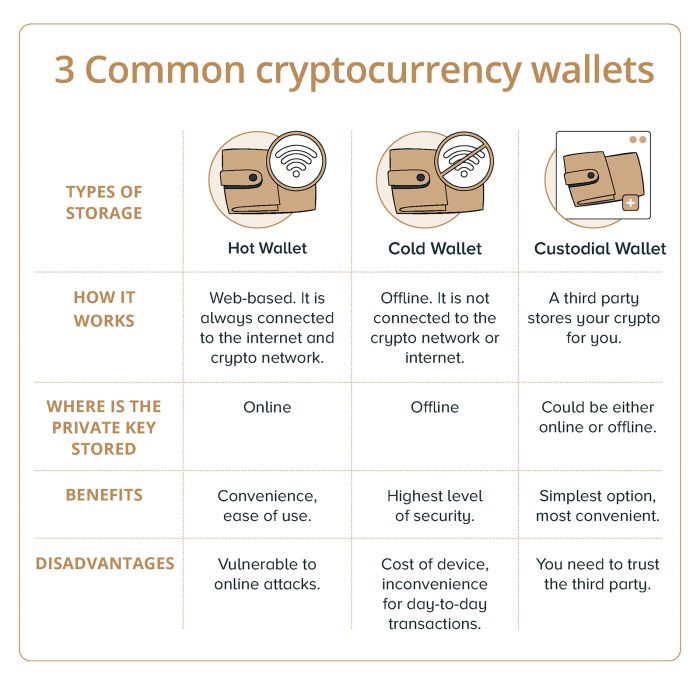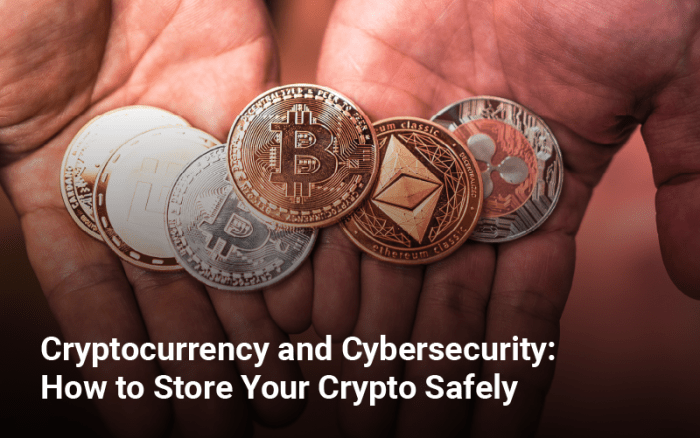How to Store Crypto Safely sets the stage for this enthralling narrative, offering readers a glimpse into a story that is rich in detail with American high school hip style and brimming with originality from the outset.
Cryptocurrency storage is no joke, and ensuring the safety of your digital assets is paramount in the fast-paced world of online transactions. Let’s dive into the world of secure crypto storage and explore the best practices to keep your investments safe and sound.
Importance of Secure Crypto Storage
Cryptocurrencies are digital assets that require secure storage to prevent unauthorized access and potential loss. Ensuring the safety of your crypto holdings is crucial to protect your investments and maintain financial security.
Risks of Insecure Storage Methods
- Private Key Exposure: Storing private keys on insecure devices or platforms can lead to theft of funds.
- Exchange Hacks: Keeping large amounts of crypto on exchanges exposes them to security breaches and theft.
- Phishing Attacks: Scammers may use phishing emails or websites to trick users into revealing their private keys or login credentials.
Types of Crypto Wallets: How To Store Crypto Safely
When it comes to storing your crypto safely, choosing the right type of wallet is crucial. There are several types of crypto wallets available, each with its own unique features and levels of security.
Hardware Wallets
Hardware wallets are physical devices that store your cryptocurrency offline, making them less vulnerable to hacking. They are considered one of the most secure options for storing crypto. Popular examples of hardware wallets include Ledger Nano S, Trezor, and KeepKey.
Software Wallets
Software wallets are digital wallets that can be accessed online or through a mobile app. While they are convenient for frequent trading, they are more susceptible to cyber attacks compared to hardware wallets. Examples of software wallets include Exodus, Electrum, and MyEtherWallet.
Paper Wallets
Paper wallets are a form of cold storage where you print out your private keys and public address on a piece of paper. This method provides a high level of security as it is not connected to the internet. However, paper wallets can be easily damaged or lost if not stored properly. Popular paper wallet options include BitAddress and WalletGenerator.
Comparison of Security Features
– Hardware wallets offer the highest level of security with offline storage and built-in encryption.
– Software wallets are convenient but more susceptible to online threats such as phishing attacks and malware.
– Paper wallets provide excellent security by keeping your keys offline, but they require careful handling to prevent loss or damage.
Choose a crypto wallet based on your trading habits and security preferences to ensure your digital assets are safe and secure.
Best Practices for Secure Storage

When it comes to storing your cryptocurrencies safely, there are a few best practices that you should follow to ensure the security of your assets.
Creating a Strong and Unique Password
- Choose a password that is long, complex, and unique to your crypto wallet.
- Avoid using common phrases or easily guessable information.
- Consider using a password manager to generate and store strong passwords.
- Regularly update your password to enhance security.
Understanding Private Keys
Private keys are essentially the access codes to your cryptocurrency holdings. They are crucial in securing your assets and should never be shared with anyone. It is important to:
- Store your private keys securely offline, such as in a hardware wallet or paper wallet.
- Avoid storing private keys on electronic devices that are connected to the internet.
- Never share your private keys with anyone, as they can be used to access and transfer your funds.
Regularly Backing up Wallet Information
Backing up your wallet information is crucial in case of unexpected events like hardware failure or loss. It is recommended to:
- Regularly back up your wallet files or mnemonic phrases.
- Store backups in multiple secure locations, such as encrypted USB drives or external hard drives.
- Test your backup and recovery process to ensure you can access your funds when needed.
Offline Storage Methods

When it comes to storing your cryptocurrencies securely, offline storage methods are a popular choice among investors. One of the most common offline storage methods is cold storage, which involves keeping your crypto assets completely offline to minimize the risk of hacking and unauthorized access.
Setting Up a Hardware Wallet for Cold Storage
Setting up a hardware wallet for cold storage is a straightforward process that ensures your crypto assets are stored securely offline. Follow these steps to set up a hardware wallet:
- Purchase a hardware wallet from a reputable manufacturer.
- Follow the instructions provided to initialize the hardware wallet.
- Generate a secure seed phrase and store it in a safe place.
- Transfer your cryptocurrencies from your exchange or hot wallet to the hardware wallet.
- Keep your hardware wallet in a secure location, such as a safe or a lockbox.
Advantages and Disadvantages of Cold Storage
Cold storage offers several advantages over hot wallets, such as enhanced security and protection against online threats. However, there are also some disadvantages to consider:
- Advantages:
- Protection against hacking and cyber attacks.
- Secure storage of large amounts of cryptocurrencies.
- Reduced risk of unauthorized access to your funds.
- Disadvantages:
- Less convenient access to your funds for trading or transactions.
- Potential risk of losing access to your funds if you forget your seed phrase.
- Hardware wallet costs may be higher compared to using a hot wallet.
Security Measures for Online Wallets
Online wallets are convenient for storing crypto, but they come with their own set of security risks. It’s crucial to take the necessary precautions to protect your digital assets from potential threats.
Common Security Vulnerabilities in Online Wallets
- Phishing Attacks: Hackers may create fake websites or emails to deceive users into providing their login credentials.
- Malware: Malicious software can infect your device and steal sensitive information, including wallet access.
- Weak Passwords: Using simple or easily guessable passwords makes it easier for attackers to gain unauthorized access.
Tips to Enhance Security of Online Crypto Storage
- Use a Secure Connection: Always access your online wallet through a secure and encrypted connection (https).
- Enable Two-Factor Authentication (2FA): Adding an extra layer of security with 2FA can significantly reduce the risk of unauthorized access.
- Regularly Update Software: Keep your device’s operating system and wallet software up to date to patch any known security vulnerabilities.
Role of Two-Factor Authentication in Securing Online Wallets, How to Store Crypto Safely
Two-factor authentication adds an extra layer of security by requiring users to provide two forms of identification before accessing their online wallet. This typically involves something you know (password) and something you have (a code sent to your phone).
Importance of Regular Updates

Regularly updating your crypto wallet software is crucial for maintaining the security of your assets. These updates often include important security patches and improvements that help protect your funds from potential threats.
Security Improvements in Software Updates
- Enhanced encryption protocols to prevent unauthorized access
- Fixes for known vulnerabilities that could be exploited by hackers
- Improved privacy features to safeguard your transaction details
Risks of Using Outdated Wallet Software
- Increased susceptibility to hacking attempts due to unaddressed security flaws
- Potential loss of funds through unauthorized transactions or account breaches
- Exposure of sensitive information to malicious actors looking to exploit outdated software





